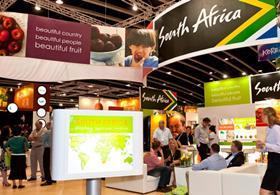
South Africa's deciduous fruit industry bodies Hortgro and SATI, along with the Fresh Produce Exporters’ Forum, FPEF, have stepped in to rescue South Africa’s participation at Asia Fruit Logistica in September.
This is a reversal of the announcement by FPEF chief executive, Anton Kruger, that South Africa’s pavilion had been cancelled due to a lack of funding, a step attributed mostly to the withdrawal of South African government support for the South African fresh produce export industry’s international promotional campaigns.
Hortgro spokesperson Jacques du Preez confirmed that the main deciduous sector bodies, Hortgro and SATI, and FPEF had reached agreement to fund South Africa’s participation in Hong Kong.
'We had to step in to save the Fruit Logistica South Africa stand (in Berlin) and now again have to fund Asia Fruit Logistica participation ourselves. The original stand will be scaled down considerably, but at least we will be there,' Du Preez said.
Du Preez noted that the South African deciduous sector is not receiving any government support for its international market development programmes: 'We hope they will change their minds and we will be engaging them to see if support can be resumed in future. We literally pulled the fat out of the fire as far as Asia Fruit Logistica is concerned long after the deadline had expired and we are pleased that this could be done.'
Exporters have previously described the lack of South African government support for the fresh produce sector's international development programmes as a source of huge concern.
'Growers and exporters already had to dig deep in their pockets to save South Africa’s Pavilion in Berlin and it is understandable that they did not see their way clear to step in again in the case of Hong Kong,' said Mr Kruger when he announced the withdrawal.
He indicated that South Africa would need to develop a financial model to secure the country’s participation in these international events.
At Fruit Logistica in Berlin the country was forced to dramatically reduce its participation after the DTI pulled the funding plug barely three months before the start of the event. The South African export industry had to come to the party to save what could be saved. Exporters who operated from the South African pavilion in Berlin had to pay dramatically higher contributions to do so and that caused some animosity in the export fraternity.
It is interesting to note that the citrus sector did not participate in the rescue package for Berlin and is also not involved with the latest effort to save participation in Hong Kong.
In the past the Citrus Growers’ Association (CGA) always maintained that they did not have a mandate from their members to engage in promotional activities. This was changed somewhat when grapefruit growers voted in favour of funding for limited campaigns in the UK and Japan.
The CGA’s statutory levies, which involve mainly research and local industry projects, are presently up for review. In May the CGA asked growers members to vote on the levies for the next term. The CGA said it was looking for at least 60 per cent of members to vote before it could take the matter forward to the Minister of Agriculture for final approval.



